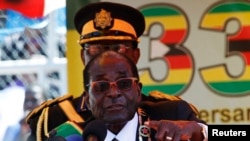In 1979 while nationalist leaders were locked in negotiations for Zimbabwe’s independence in England, ordinary people waited in anticipation for a breakthrough that would bring an end to years of war and destruction.
With the country’s Independence Day just a week away, some Zimbabweans say the fond memories of 18th April 1980 are in stark contrast to the prevailing hardships in the country, rendering the meaning of independence worthless.
Fifty-two year-old Annastacia Moyo, a Bulawayo resident, was a teenager at the height of the liberation war in the late 1970s. Mrs. Moyo had to abandon books after the mission school she was attending was closed in 1978 as the war was reaching its climax.
Mrs. Moyo says she vividly remembers Independence Day in 1980 as she, along with her siblings and other locals, celebrated the birth of a new nation with excitement mixed with happiness and fervent hope for a brighter future.
“We were very very excited as a family because we believed Zimbabwe had come. It was my two sisters and my brother. My father had actually given in to our pressure –we were teenagers at that time and we had wanted to go to Harare to meet Joshua Nkomo but had failed because of logistical problems in terms of transport. We went to Barbourfields and it was so full; people were singing and it was a hive of activity – the air was filled with happiness.”
BETTER LIFE
Mrs. Moyo draws a sharp contrast between the first independence commemoration and the ones in the recent past. She says the optimism for a better life, shared by the majority in 1980, has now turned into despair and frustration, as life has been getting increasingly tough over the years. She says many people her age feel that despite the racial discrimination, they were better off under white rule.
“Today it is disastrous in that there is no industry, people are not working, there is no food on the table, people are on the streets selling all sorts of things. And when they try to sell council police occasionally arrests these people who are trying to earn an honest living, so, it’s now painful in Zimbabwe.
“Our children, who are the youths just like we were at independence, are being forced to go out of the country because there is nothing for them in the motherland. I see independence as the source of all the problems that we are facing.”
HAPPINESS
Mpho Mhlophe, another Bulawayo resident, says Zimbabwe’s independence brought with it a mixture of happiness and a sense of relief. Mhlophe’s parents had been heavily involved in the armed struggle and she along with her siblings, often had to stay with relatives, as their Pelandaba home was constantly under siege from Rhodesian security agents.
For Mhlope, Independence Day was a family affair, with a number of people converging at her parents’ home for a get-together in honour of the day.
Retired Colonel Patron Nketha Khutshwekhaya was a cadre in the Zimbabwe People’s Revolutionary Army, or ZIPRA, the armed wing of Zapu then led by Joshua Nkomo. Khutshwekhaya operated in the northern part of the country. At the end of the war he was one of the people responsible for overseeing the movement of ZIPRA combatants into the assembly point at Rukomechi in the Zambezi valley.
Khutshwekhaya spent Independence Day confined in the camp with other ex-combatants, but says there was an all-round feeling of happiness.
Khutshwekhaya laments the prevailing hardships and says the fallen heroes who gave their lives for the independence of the country must be turning in their graves.
“There is one thing that you can feel around the country especially among the youths … poverty is growing, the few who are rich are getting richer each day. People have got multiple farms and yet some people have nothing and things are not working for most people. Whilst we are celebrating, if the people who died during the war of liberation had a chance to come back, they would be very disappointed.”
VETERAN NATIONALIST
Cephas Msipa, a veteran nationalist, who is one of the few senior former Zapu members remaining, also has a very clear recollection of independence day. Like most nationalist leaders and thousands of Zimbabweans, Msipa, who had participated in the Lancaster House negotiations in England, was at the Rufaro Stadium in the then Salisbury, where the main celebrations took place.
Msipa agrees. “I know speeches will be made, promises will be made but life is getting tougher for our people. Before independence we were giving people the hope that our country will be one full of milk and honey, meaning there would be enough to eat and people would be happy. But all that is not happening. The speeches we hear on independence day are just platitudes.”
Despite the current circumstances, there is no doubt that those who were old enough to be part of the first independence day celebrations have pleasant memories, which, most of those born after independence find hard to comprehend, owing to the problems that have been brought on by several years of economic decline.






